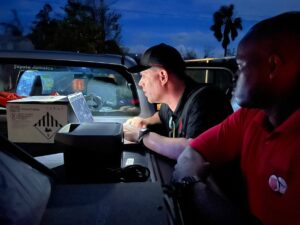The Salvation Army’s three-pronged approach aligns with factors driving national reduction.
For the first time in over five years, drug overdose deaths in the United States declined, marking a hopeful shift in the fight against the fentanyl crisis. Data from the Centers for Disease Control and Prevention (CDC), showed a 27 percent decrease compared to the 110,037 deaths recorded in 2023.
Experts attribute this progress to targeted community interventions, expanded harm reduction efforts and increased access to naloxone—commonly known as Narcan—which became available over the counter in 2023. The nasal spray rapidly reverses opioid overdoses by blocking receptors and restoring steady breathing, typically working within two minutes.
“For a crisis that has been getting worse year after year, this is a step in the right direction,” said Dr. Brian Hurley, Medical Director at the Substance Abuse Prevention and Control Bureau for Los Angeles County of Public Health. “We believe the availability of naloxone has kept more people alive than ever.”
Across the western United States, The Salvation Army is tackling the opioid crisis through three complementary strategies: direct intervention at emergency shelters, holistic rehabilitation programs and community education initiatives.
Narcan as a lifeline
Throughout Denver, The Salvation Army operates low-barrier shelters where staff carry Narcan and are prepared to respond to overdoses at any time. Nathan Parrot, Program Manager of the Denver Navigation Center, highlighted the crucial role the shelters play in a city struggling with high rates of drug use.
Parrot said that by having operations throughout the city, locals know they can turn to The Salvation Army for both immediate and long-term drug-use support.
“With Narcan, automated external defibrillators and trained staff, we can respond rapidly to an overdose,” Parrot said. “In 2024, we saved over 50 individuals from an overdose by utilizing Narcan.”
The city of Denver saw a slight decrease in overdose deaths in 2024—down 0.6 percent—marking the first decline since 2017, according to data from the Colorado Coalition.
In the same year, J’azmin Smith, a Program Administrator at The Salvation Army-operated shelters in Denver, saved 22 people from overdoses and was honored with the Lifesaver Award from Salvation Army Shelter Directors.
“I can identify those who may be at higher risk of an overdose,” Smith said. “I monitor everyone closely, watching for any signs of use or symptoms of an overdose,” which include loss of color in the face, confusion, unresponsiveness and irregular breathing.
In Modesto, California, The Salvation Army Berberian Emergency Shelter provides beds for up to 388 guests. Shelter Director Jim Stokes reports staff members have saved at least eight people with Narcan.
“Narcan has been a game changer,” Stokes said. “If someone begins to overdose, chances are Narcan is available within a few feet.”
Their expanded training has made them a resource for the surrounding community, as they engage with individuals living on the streets and provide Narcan to those battling substance abuse.
“Some people are still deep in addiction; that doesn’t mean we should turn them away or refuse help,” Stokes said.
Through emergency shelter and support, individuals can connect to long-term recovery programs at Adult Rehabilitation Centers (ARCs).
“There’s always an option to connect people to our Adult Rehabilitation Centers,” Stokes said. In 2024, 12 individuals entered the ARC from the Berberian shelter.
Narcan is available at ARC locations across the West, but according to ARC Commander Lt. Colonel Mark Nelson, it is rarely used within the recovery program. “Thankfully, we don’t see many overdoses in our program environments,” he said.
Empowering communities through education
With the increased Narcan availability, The Salvation Army has organized free training events to educate the public. In San Bernardino, California, The Salvation Army hosts annual training in partnership with the County Department of Public Health, educating some 100 individuals per session since 2023.
“Many community members want to make a difference and get involved,” said Naomi Kuhlman, director of programs at the San Bernardino Corps. “These training events help raise awareness and educate the public.”
The Cathedral City Corps held a similar training event in October 2024. Among the participants was Brenda Richardson, who was surprised by the medication’s simplicity.
“I was surprised to see just how easy it is. You don’t have to be a doctor to use it,” Richardson said. “Now I just keep some in the trunk of my car because you never know when you may come across an emergency.”
The recent drop in overdose deaths represents a hopeful trend, but experts caution that ongoing interventions remain crucial. Whether through education, policy advocacy or direct support, the battle requires concerted effort from multiple sectors.
“Everyone has the opportunity to learn how to reverse an overdose,” Hurley said. “By carrying Narcan, anyone can make a difference and save a life.”
Do Good:












